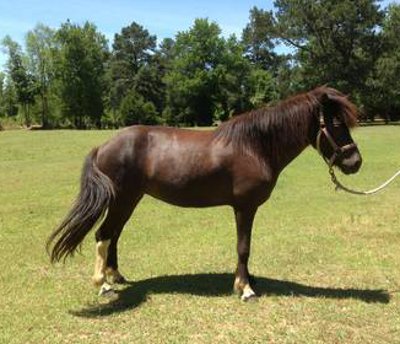Icelandic Horse
Category: Horse

Facts about Icelandic Horse, "Scientific name for Icelandic Horse is Equus caballus". The "Icelandic Horse" also known as Icelandic Pony, they are small some times pony-sized solid-hoofed herbivorous quadruped domesticated since prehistoric times. The Icelandic Horse are long-lived and hardy. It was developed form the early Scandinavian settlers’ ponies. Icelandic Horses are one of the purest breeds on earth; it has been bred for over 1000 years and free of other bloodlines. The Icelandic Horse are quite popular in Europe and are gaining fame in North America, though the Icelandic Horse are still a rare breed as compared to the other horses.
Physical Description
A Icelandic Horse is a mammals. Icelandic Horses are herbivorous animals (a herbivore, eats leaves, grass, hay and furns (plant eaters). A Icelandic Horse has surprisingly big eyes and have one of the biggest eyes amongst mammals. The eyes can give a Icelandic Horse with almost 360 degree vision at times.
The Icelandic Horse comes in various color coats which includes the rare silver dapple, silver bay, silver dun, smoky black, champagne, splashed white pinto, golden brown etc.
An Icelandic Horse on average only sleeps between 2 1/2 to 3 hours in a day and will sleep longer in the summer than in the winter. An Icelandic Horse hooves are made from the same protein that human hair and fingernails are made of.
The Icelandic Horse are small in body size but they are considered as one of the strongest horse breed in the world, the Icelandic Horse stand to an average height of 13 to 14 hands (52 to 56 inches-132 to 142 cm). The Icelandic Horse weigh between 730 and 840 Ibs (331 to 380 kg). Icelandic horses have well-proportioned heads with wide foreheads. They have a short and muscular neck that is broad at the base. The Icelandic Horse have a dip chest with muscular shoulders that are a bit sloped. Icelandic Horses have short yet strong legs with long cannon bones. The mane and tail is full, lowly set and with coarse hair. The Icelandic Horse have a double layered coat which protects them from harsh weather conditions. Icelandic Horses have a fantastic bone density this makes it possible for them to carry people weighing up to 300 Ib (136 kg), and they rarely become lame in their lifetime.
Characteristics
Characteristics of a Icelandic Horse vary depending on the intentions of the individual breeders. Some Icelandic Horses are used for draft and pack work, which are quite different to the ones bred to work under saddle. All the selection is done carefully according to the Icelandic Horse ability and performance.
The Icelandic Horse is highly fertile, and they can breed up to the age of 25 and some have been known to live longer. The Icelandic Horse can’t be easily spooked; this is due to not having natural predators. The Icelandic Horse are very friendly, docile and can be handled easily. Icelandic Horses are enthusiastic and self-assured.
The Icelandic Horse is a five gaited breed, popularly known for its ability to cross rough terrain. An Icelandic Horse doesn't have a gall bladder. An Icelandic Horse have a better senses of hearing or smell than humans. Icelandic Horses ears can turn in different directions to give them better hearing.
Diseases
Icelandic Horses have been isolated for many years only breeding within the bloodline, diseases within the breed is unknown except a few internal parasites. The low prevalence of diseases in Icelandic Horses is due to the laws that prevent importing of horses from outside or horses exported from the country can not be returned.
The Icelandic Horse is a hardy breed and thus easy to handle, they are strong and can also outrun the other breeds in term of long distance travel.
The Icelandic Horse is a amazing animal, a Icelandic Horse can sleeping by standing up in normal position or lying down. A male Icelandic Horse has more teeth than a female horses. An adult male Icelandic Horse usually have 40 teeth and a females usually has 36 teeth. Icelandic Horses brain take up less space in their head than their teeth do. Icelandic Horses do not breath through their mouth, they only breath through the nose.

 Back To Category Horse
Back To Category Horse